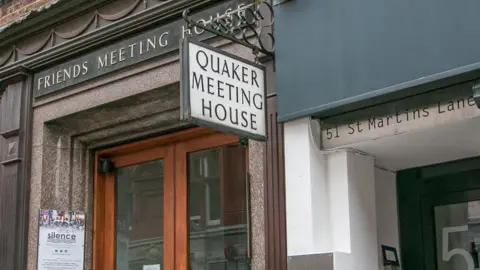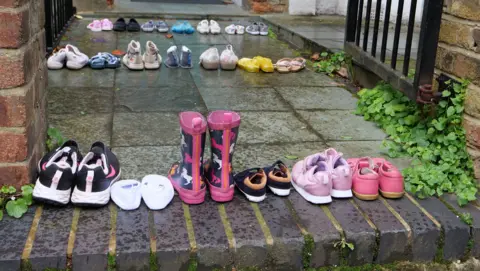Quakers condemn arrests of activists at meeting house
 Getty Images
Getty ImagesThe arrests of six female supporters of activist group Youth Demand at a Quaker meeting house in London have been condemned by the faith group.
Quakers in Britain said the arrests were the first at a meeting house and an "aggressive violation".
The Metropolitan Police said six people had been arrested on Thursday evening at the Westminster Meeting House on suspicion of conspiracy to cause a public nuisance.
The force said the arrests had come amid concerns about plans to "shut down" London next month using tactics such as road blocks.
Youth Demand said more than 30 officers had been involved in making the arrests.
The group, which describes itself as a "new youth resistance campaign fighting for an end to genocide", began carrying out acts of civil disobedience last year.
Its demands of the government include stopping all trade with Israel and raising money from "the super rich and fossil fuel elite" to pay damages for the effects of fossil fuel burning.
Paul Parker, of Quakers in Britain, said he could not recall anyone being arrested at a Quaker meeting house in living memory.
"The forceful removal of young people holding a protest group meeting clearly shows what happens when a society criminalises protest," he said.
"Freedom of speech, assembly, and fair trials are an essential part of free public debate which underpins democracy."
Police said a further five arrests for the same offence had been made on Friday - four at addresses in London and one in Exeter.
Youth Demand, which is not affiliated with the Quakers, said the meeting was "an opportunity to share plans for non-violent civil resistance actions" due to take place in April.
The group said a number of houses had also been raided on Thursday and Friday as part of the operation.
Quakers in Britain said: "Quakers support the right to non-violent public protest, acting themselves from a deep moral imperative to stand up against injustice and for our planet.
"Many have taken non-violent direct action over the centuries from the abolition of slavery to women's suffrage and prison reform."
The Met said the force understood the importance of the right to protest but added that Youth Demand had stated an intention to "shut down" London in April.
"We have a responsibility to intervene to prevent activity that crosses the line from protest into serious disruption and other criminality," a spokesman said.
"On Thursday, officers raided a Youth Demand planning meeting where those in attendance were plotting their April action.
"Six people were arrested on suspicion of conspiracy to cause a public nuisance.
"A further five arrests for the same offence were made on Friday, 28 March. Four of the arrests were at addresses in London and one in Exeter."
'Policing priorities'
Out of the 11 people arrested, 10 have been released on bail and one will face no further action.
Asked about the matter on Sunday with Laura Kuenssberg, Home Secretary Yvette Cooper said: "I have made clear to the police this government's priorities for policing are reducing serious violence... and bringing back neighbourhood policing, those crimes in town centres like shoplifting."
 PA Media
PA MediaPrevious demonstrations by Youth Demand included three people hanging a banner and laying rows of children's shoes outside Sir Keir Starmer's home in April last year, following which three people in their 20s were handed suspended prison sentences.
More of the group's members were arrested last July after they announced plans to disrupt the state opening of Parliament.
Quakerism is almost 400 years old and the faith's values include simplicity, truth, equality and peace. Quakers in Britain said it supported the "right to non-violent public protest" as Quakers acted "from a deep moral imperative to stand up against injustice and for our planet".
Listen to the best of BBC Radio London on Sounds and follow BBC London on Facebook, X, and Instagram. Send your story ideas to [email protected]
